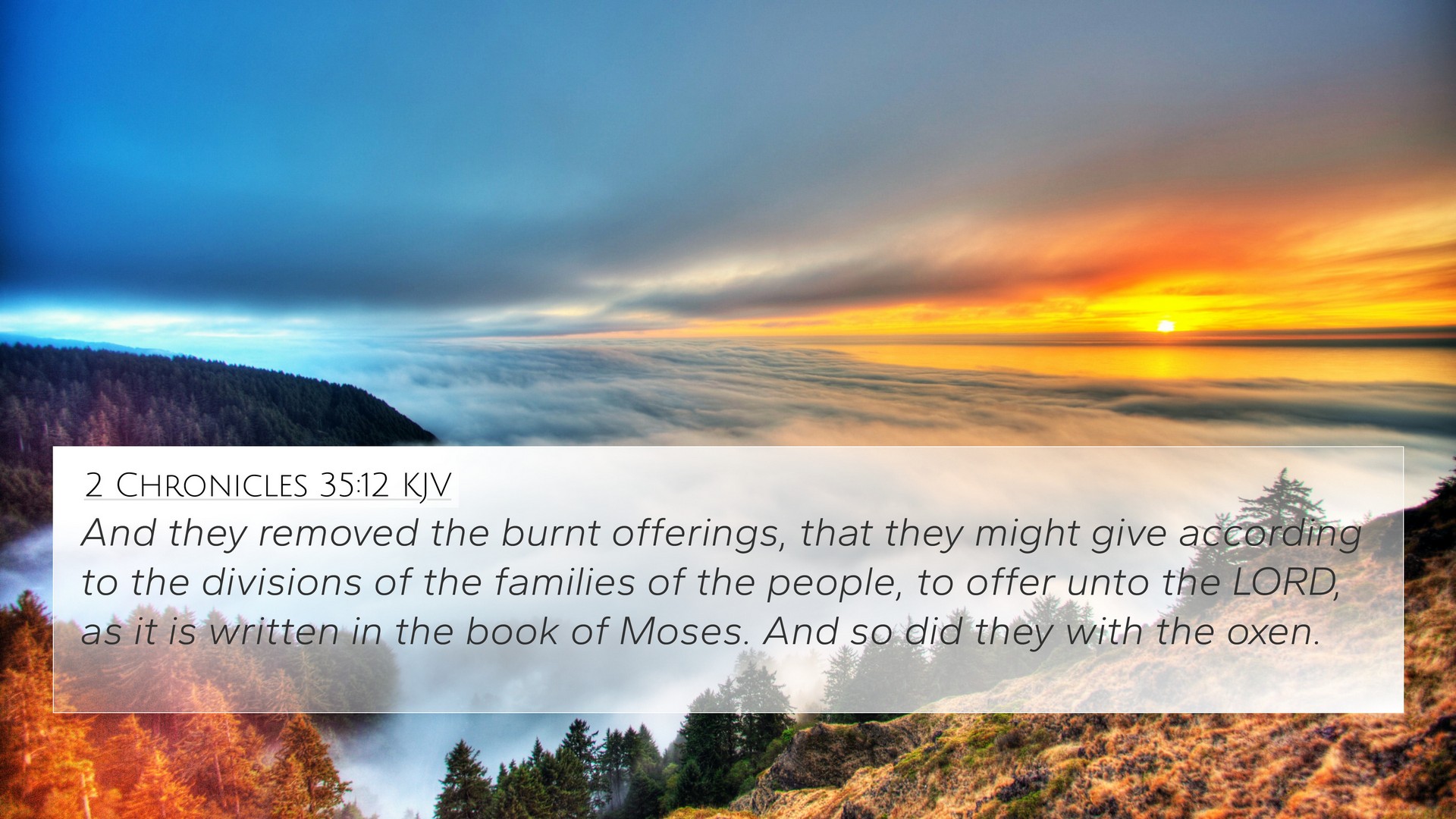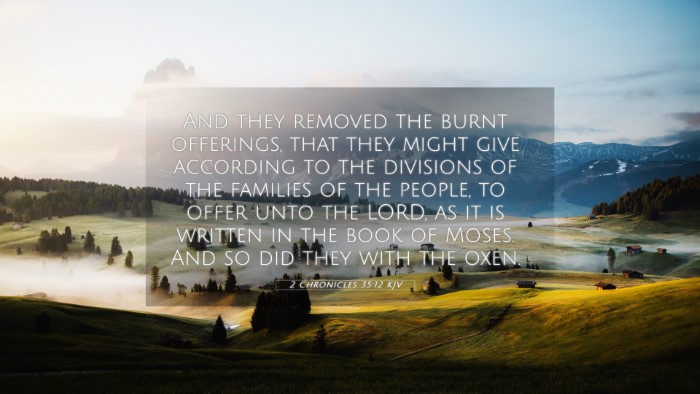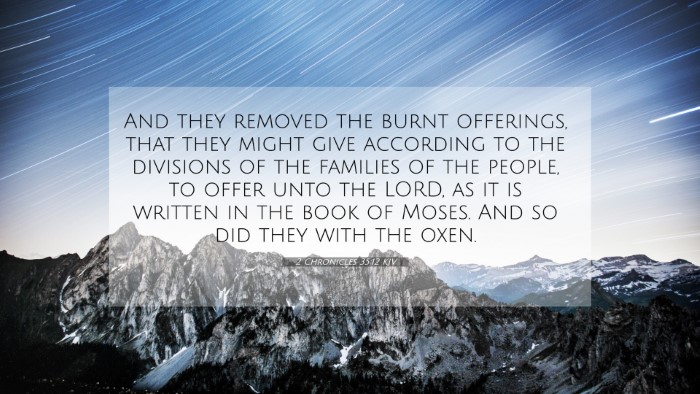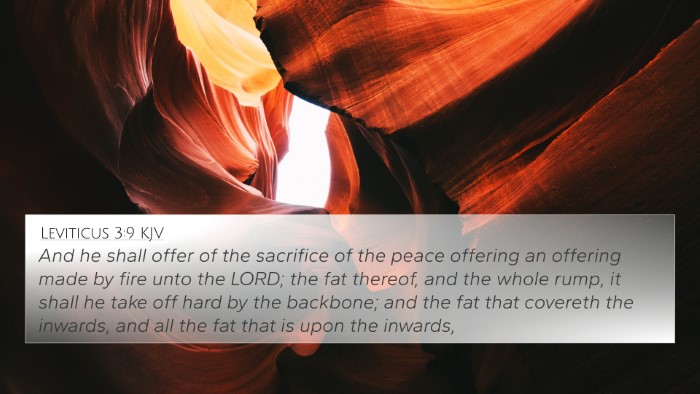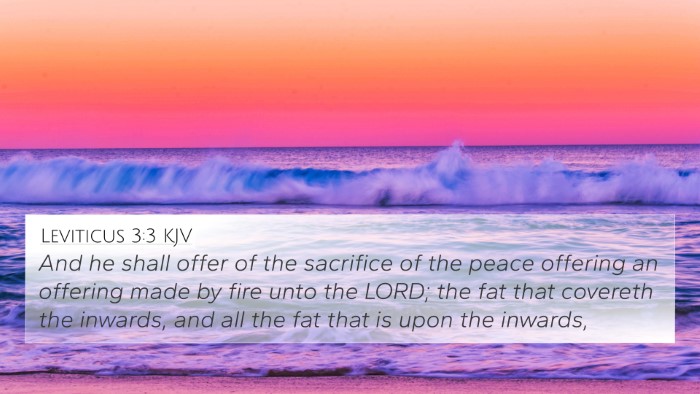Understanding 2 Chronicles 35:12
Verse: 2 Chronicles 35:12 states, "And they removed the burnt offerings, that they might give according to the divisions of the families of the people, to offer unto the LORD, as it is written in the book of Moses." This verse captures the essence of obedience to God’s commands through the observance of ritual offerings.
Meaning and Interpretation
In 2 Chronicles 35:12, we see a significant act of worship during King Josiah's reforms, emphasizing the importance of adhering to God's ordinances as recorded in the scriptures. The organized removal of burnt offerings illustrates the collective effort made to honor God appropriately through prescribed rituals.
Contextual Significance
The historical context reveals that King Josiah was committed to restoring proper worship in Judah, purging the land of idolatry and returning the people to the observance of the Mosaic Law.
Insights from Commentaries
- Matthew Henry:
Henry explains that this act was part of a broader revival of religion, showing the sincere desire of the people to glorify God through obedience. The care taken to provide for the offerings reveals an understanding of divine requirements and a communal approach to worship.
- Albert Barnes:
Barnes highlights that the process was not merely a ritualistic endeavor but a revival of the covenantal relationship between God and His people. By adhering to the written laws, the people re-emphasized their dedication to God’s service.
- Adam Clarke:
Clarke notes that the focus on the family divisions in the offering underscores the inclusivity of the worship practices, inviting every member of the community to participate in the sacrificial system laid down by the Law.
Cross-References
This verse connects with various other scriptures that further enhance its meaning:
-
Exodus 12:6: "And ye shall keep it up until the fourteenth day of the same month..." - This lays the groundwork for the observance of sacrifices, relating it to the Passover.
-
Leviticus 1:1-4: "And the LORD called unto Moses, and spake unto him out of the tabernacle of the congregation..." - Details the procedure for burnt offerings.
-
Deuteronomy 16:16: "Three times in a year shall all thy males appear before the LORD thy God..." - Demonstrates the principle of approaching God with set intentions.
-
2 Kings 22:8-11: "And Hilkiah the high priest said unto Shaphan the scribe, I have found the book of the law in the house of the LORD..." - Offers insight into the biblical rediscovery leading to Josiah's reforms.
-
Psalm 119:105: "Thy word is a lamp unto my feet, and a light unto my path." - Highlights the guidance that God's law provides, underlining the significance of the writings of Moses.
-
Hebrews 10:1: "For the law having a shadow of good things to come..." - Connects Old Testament rituals with the eventual fulfillment in Christ.
-
Isaiah 1:11-14: "To what purpose is the multitude of your sacrifices unto me?" - Focuses on the attitude behind sacrificial worship.
Thematic Connections
2 Chronicles 35:12 resonates with themes of obedience, community worship, and reformation in spiritual practices. The verse serves as a reminder of the importance of collective adherence to God's commandments and the communal dimension of biblical worship.
Applying the Verse Today
In a contemporary context, this verse encourages believers to actively engage in worship and to align their practices with scriptural teachings. It prompts questions about how communities can structure their worship in ways that honor God and fulfill scriptural instructions.
Tools for Further Study
To delve deeper into the meaning of 2 Chronicles 35:12 and other related scriptures, consider utilizing:
- Bible concordance
- Cross-reference Bible study guides
- Cross-reference Bible study methods
- Bible chain references
- Comprehensive Bible cross-reference materials
Conclusion
2 Chronicles 35:12 acts not just as a historical record but as a rich source of spiritual instruction that continues to resonate in the life of church communities today. Through understanding its implications and interconnections with other scriptures, readers can gain deeper insights into God's expectations and the community's role in worship.
